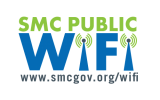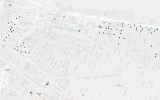Redwood City – The County of San Mateo is bringing free high-speed wireless internet access to areas of the North Fair Oaks and Stambaugh Heller neighborhoods of Redwood City. This expansion of SMC Public WiFi provides free wireless Internet access to 665 unconnected K-12 students and to thousands of residents and community members who live or visit these neighborhoods.

The newly expanded network consists of almost 100 WiFi access points mounted on streetlight poles. An interactive map of all SMC Public WiFi locations can be found at: https://www.smcgov.org/smc-public-wifi-project.
The large scale of this project brought significant planning complexity and engineering challenges: The expanded network spans Chestnut Street, Rolison Road, Hoover Street and adjacent areas.
“Bringing wireless connectivity to these Redwood City neighborhoods was a challenge because we didn’t have a direct line-of-sight to beam the signal in,” said Jon Walton, the County’s chief information officer, “Instead of looking at what can’t be done, we challenged ourselves and our partners on how we can do it. This ‘can do’ spirit allowed us to build a blueprint for future communitywide WiFi projects.”

Map depicting SMC Public WiFi access point locations across Redwood City. The black and blue dots represent wireless access points, and the orange dots represent K-12 students with reported connectivity issues.
“It is because of community collaboration and determination that this vital project was completed,” said District Four Supervisor Warren Slocum. “I’m proud of the way our community rallied and worked together to connect their neighbors. Together, we’ve taken the first step in creating connected neighbors and communities in San Mateo County, particularly for our most vulnerable residents.”
The line-of-sight problem was overcome by partners and longtime community members - Stanford University, Kaiser Permanente Redwood City Medical Center, and Equity Residential’s Avenue Two Apartments, whose buildings provided the access, power and line-of-sight visibility to reach the areas needing connectivity most. Collaboration between public and community partners was instrumental to overcoming the technical hurdles, facilitating the permit process, accelerating the installation process, and pinpointing coverage.
“Due to the COVID-19 pandemic, we have recognized how important it is to support the access to technology so that all members of our community are successful in their ability to learn,” said Sheila Gilson, senior vice president and area manager for Kaiser Permanente Redwood City Medical Center.
Executive Vice President of Equity Residential Barry Altshuler said, “We have been a part of this community as a housing provider for many years and saw firsthand the impacts of those children and families affected by the pandemic. We are extremely humbled to be part of the public private partnership working collaboratively to bring Internet service to the digitally underserved children and families in our community. We look forward to doing more with our partners to continue making a difference in our community.”
“Stanford is pleased to be able to utilize our new buildings on our Redwood City campus to help broaden the reach of San Mateo County’s public WiFi network. This year has brought to light many new ways for establishing stronger private-public partnerships to support our community during these difficult times. Access to free public WiFi will support students’ connection to remote learning, strengthen the resiliency of the remote workforce, and expand access to health care through online services,” said Lucy Wicks, assistant vice president for government affairs at Stanford.
In addition to community partners, other civic and education partners such as the City of Redwood City and the Sequoia Union and Redwood City Elementary school districts were key contributors to this project.
This expansion of the SMC Public WiFi network is part of the San Mateo County Digital Inclusion Initiative and was funded by part of the $6.3 million from the Coronavirus Aid, Relief, and Economic Security (CARES) Act grant.
To date, the Digital Inclusion Initiative has provided 650 qualifying students in the Ravenswood City Elementary and La Honda-Pescadero Unified School Districts with T-Mobile hotspots and Comcast Internet Essentials connections, and installed nearly 100 SMC Public WiFi access points across the Woodland Park Communities in East Palo Alto, providing in-home SMC Public WiFi to 223 K-12 students with reported connectivity issues and more than 4,000 other residents who call Woodland Park home.
The Initiative also created SMC Public WiFi “Park and Connect” locations at the Hoover Elementary and SportsHouse Sports Complex of Redwood City, allowing the public to walk, ride, or drive to the location and access the internet from their parking lot. These two sites are positioned between 456 K-12 students with reported connectivity issues. A third Park and Connect site was created at the East Palo Alto City Hall and sits near 216 K-12 students who have trouble getting online.
The Digital Inclusion Initiative also provides free wireless internet access to approximately 1,428 K-12 students through the expansion of 13 SMC Public WiFi and 12 Public Library sites across Daly City, Brisbane, South SF and San Mateo.
“As the lead private sector coalition partner bridging the digital equity divide, we are thrilled with the expansion of the program. Ultimately, we have a bold vision for a new model to provide Direct Digital Services (DDS) to communities across San Mateo County. Building upon the foundation we've collaboratively developed and implemented, achieving this broader public service goal would be a centennial game-changer. Digital expansion of critical services will drastically accelerate the county's recovery and position it as a next-generation digital public sector leader," says Dao Jensen, CEO of Kaizen Technology Partners.
The latest SMC Public WiFi sites are a continuation of the SMC Public WiFi Project which has brought free public WiFi to over 100 locations across the County. An interactive map of these locations can be accessed here. The SMC Public WiFi Project’s mission is to bring connectivity to underserved communities, support educational opportunities for students, spur local economic development, and provide greater access to County services.